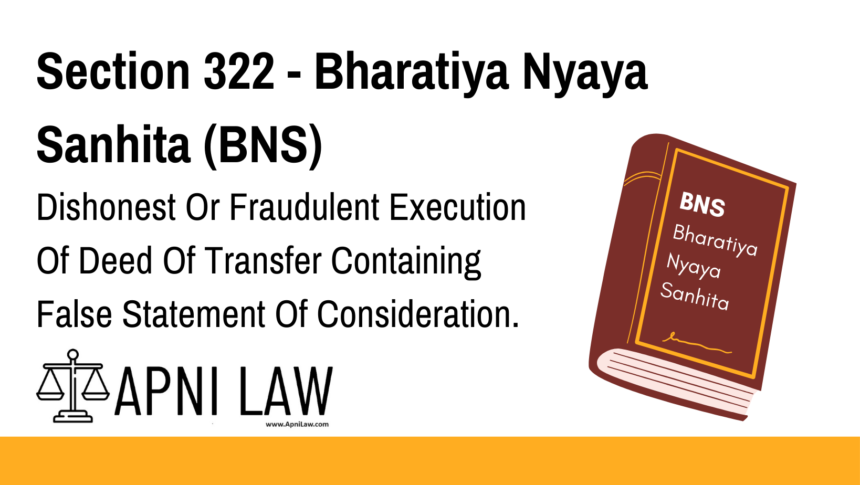Code: Section 322 BNS
Whoever dishonestly or fraudulently signs, executes or becomes a party to any
deed or instrument which purports to transfer or subject to any charge any property, or any
interest therein, and which contains any false statement relating to the consideration for
such transfer or charge, or relating to the person or persons for whose use or benefit it is
really intended to operate, shall be punished with imprisonment of either description for a
term which may extend to three years, or with fine, or with both.
Explanation of Section 322 BNS
Section 322 of the Bharatiya Nyaya Sanhita (BNS) deals with fraudulent activities involving the execution of property transfer deeds. It criminalizes the act of dishonestly or fraudulently making false statements in such documents, especially regarding the consideration (price) for the transfer or the intended beneficiaries.
This provision is crucial to prevent property fraud, which can lead to significant financial and legal disputes. It ensures that property transactions are conducted with honesty, transparency, and integrity.
Key Elements of the Offense:
- Dishonest or fraudulent intent: There must be a clear intention to deceive.
- False statements in the deed: This can be related to the consideration amount or the intended beneficiaries of the transfer.
- Involvement in the transaction: The person must have actively signed, executed, or participated in the fraudulent deed.
Illustration
Example 1: Understating Property Value
A person sells a property worth ₹50 lakh but falsely states in the deed that the consideration is ₹20 lakh to avoid paying higher stamp duty. This act of underreporting the true value is punishable under Section 322.
Example 2: Misrepresenting Beneficiaries
A person creates a deed transferring property to a family member but falsely claims that the property is intended for a charitable organization to claim tax benefits. This fraudulent representation falls under Section 322.
Common Questions and Answers on Section 322 BNS
1. What does Section 322 BNS prohibit?
- Answer: It prohibits dishonest or fraudulent actions in the execution of property transfer deeds, specifically involving false statements about consideration or intended beneficiaries.
2. What types of false statements are covered under this section?
- Answer: False statements about the actual price paid (consideration) for the property or about who the property is intended to benefit.
3. What are the punishments under Section 322 BNS?
- Answer: The offender can face imprisonment for up to three years, a fine, or both.
4. Does this law apply to both movable and immovable property?
- Answer: Yes, it applies to all types of property transfers, whether movable or immovable.
Conclusion
Section 322 of the BNS plays a vital role in maintaining the integrity of property transactions in India. By criminalizing fraudulent property transfers and misrepresentations, it protects the rights of buyers, sellers, and intended beneficiaries, ensuring fair dealings in the real estate sector.











